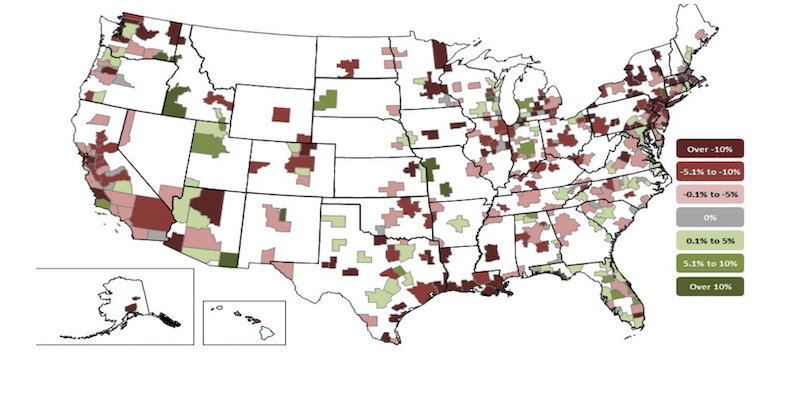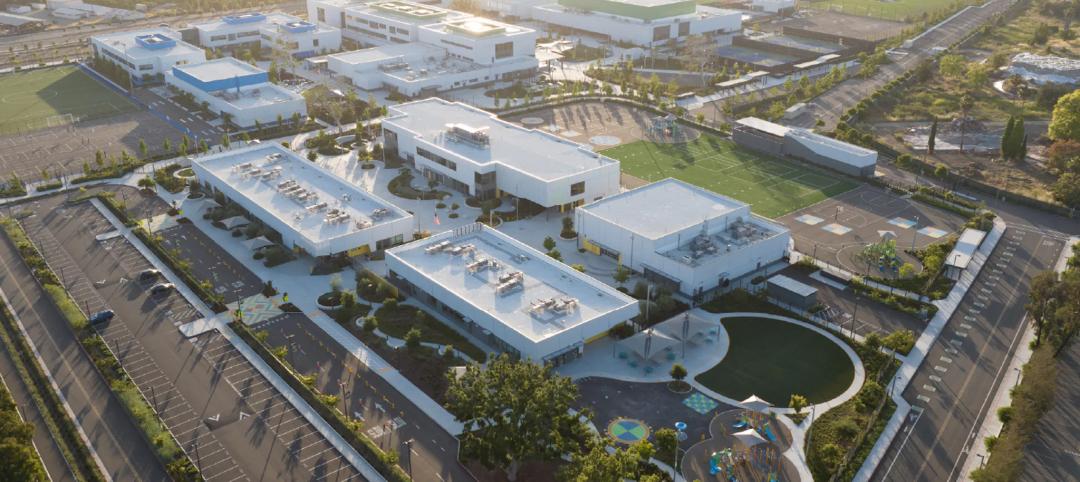Construction officials outlined a series of steps public officials and the construction industry should take to address the impacts of the built environment on climate change. The new initiative from the Associated General Contractors of America is designed to lessen the carbon footprint of the built environment while also making the process of building projects even more efficient.
“The construction industry is the delivery vehicle for building a greener, more climate friendly future,” said Stephen E. Sandherr, the association’s chief executive officer. “Finding a way to ensure that what our members build is more efficient will have a significant impact on climate change.”
Sandherr noted that construction activity accounts for less than two percent of greenhouse gas emissions in the United States. Meanwhile, the built environment accounts for approximately one-third of greenhouse gas emissions. As a result, while the new initiative includes steps construction firms can take to operate more efficiently, the bulk of the effort is focused on pushing for public and private project owners to build more efficient projects and discovering how we can also support them in that process.
Among the measures outlined in the new initiative include calling for a national strategy to invest in physical infrastructure that will make communities more resilient. The association is also calling for an increase in investments and funding opportunities for public and private infrastructure to build more efficient highways, water plants and other facilities.
Public officials should also invest in modernizing federal buildings to make them more efficient. The association is also calling for expanding tax incentives and deductions to encourage the private sector to build more efficient buildings. And the group is calling for expedited permitting for projects that improve efficiency and reduce greenhouse gas emissions.
Association officials also identified steps contractors can take to operate more efficiently. This includes encouraging equipment manufacturers to improve the fuel efficiency of their equipment, helping firms learn how to reduce equipment idling and sharing information about industry innovations like solar powered job site trailers and energy efficient job site lighting.
The new initiative was crafted by a special climate change task force for the association created earlier this year. Representatives from 18 different member firms participated in the task force meetings and helped craft the recommendations outlined in the initiative. “You can’t wish for a greener future, you have to build it,” said Les Snyder, the president of Shikun & Binui America in Pittsburgh and the chair of the association’s climate change task force.
Click here to view details of the association’s new climate change initiative.
Related Stories
Building Technology | Jun 18, 2024
Could ‘smart’ building facades heat and cool buildings?
A promising research project looks at the possibilities for thermoelectric systems to thermally condition buildings, writes Mahsa Farid Mohajer, Sustainable Building Analyst with Stantec.
University Buildings | Jun 18, 2024
UC Riverside’s new School of Medicine building supports team-based learning, showcases passive design strategies
The University of California, Riverside, School of Medicine has opened the 94,576-sf, five-floor Education Building II (EDII). Created by the design-build team of CO Architects and Hensel Phelps, the medical school’s new home supports team-based student learning, offers social spaces, and provides departmental offices for faculty and staff.
Codes and Standards | Jun 17, 2024
Federal government releases national definition of a zero emissions building
The U.S. Department of Energy has released a new national definition of a zero emissions building. The definition is intended to provide industry guidance to support new and existing commercial and residential buildings to move towards zero emissions across the entire building sector, DOE says.
Mass Timber | Jun 10, 2024
5 hidden benefits of mass timber design
Mass timber is a materials and design approach that holds immense potential to transform the future of the commercial building industry, as well as our environment.
Mass Timber | May 31, 2024
Mass timber a big part of Western Washington University’s net-zero ambitions
Western Washington University, in Bellingham, Wash., 90 miles from Seattle, is in the process of expanding its ABET-accredited programs for electrical engineering, computer engineering and science, and energy science. As part of that process, the university is building Kaiser Borsari Hall, the 54,000-sf new home for those academic disciplines that will include teaching labs, research labs, classrooms, collaborative spaces, and administrative offices.
MFPRO+ New Projects | May 29, 2024
Two San Francisco multifamily high rises install onsite water recycling systems
Two high-rise apartment buildings in San Francisco have installed onsite water recycling systems that will reuse a total of 3.9 million gallons of wastewater annually. The recycled water will be used for toilet flushing, cooling towers, and landscape irrigation to significantly reduce water usage in both buildings.
Mass Timber | May 22, 2024
3 mass timber architecture innovations
As mass timber construction evolves from the first decade of projects, we're finding an increasing variety of mass timber solutions. Here are three primary examples.
K-12 Schools | May 13, 2024
S.M.A.R.T. campus combines 3 schools on one site
From the start of the design process for Santa Clara Unified School District’s new preK-12 campus, discussions moved beyond brick-and-mortar to focus on envisioning the future of education in Silicon Valley.
Sustainability | May 10, 2024
Perkins&Will’s first ESG report discloses operational performance data across key metrics
Perkins&Will recently released its first ESG report that discloses the firm’s operational performance data across key metrics and assesses its strengths and opportunities.
Sustainable Development | May 10, 2024
Nature as the city: Why it’s time for a new framework to guide development
NBBJ leaders Jonathan Ward and Margaret Montgomery explore five inspirational ideas they are actively integrating into projects to ensure more healthy, natural cities.

















